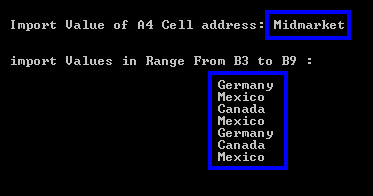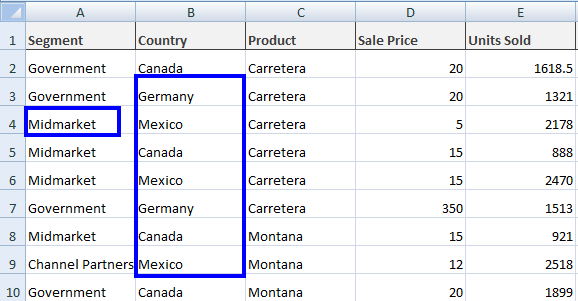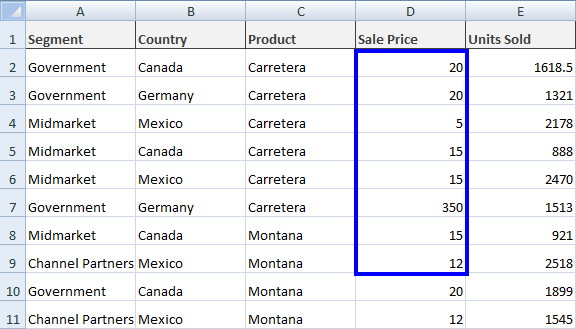如何在 C# 中导入 Excel 文件
IronXL 使 C# 开发人员只需一行代码即可导入 Excel 数据,支持 XLSX、CSV 和其他格式,无需 Interop 依赖性,允许立即访问单元格、范围和工作表进行数据操作。
快速入门:立即加载您的 Excel 文件
只需使用 IronXL.Excel 的无超时 API 调用一个方法,您就可以在几秒钟内加载任何受支持的 Excel 表单(XLSX、CSV 等)--无需 Interop,无需大惊小怪。 立即开始与工作簿进行交互,根据需要访问单元格、区域或工作表。
 立即开始使用 NuGet 创建 PDF 文件:
立即开始使用 NuGet 创建 PDF 文件:
使用 NuGet 包管理器安装 IronXL
复制并运行这段代码。
WorkBook wb = IronXL.WorkBook.Load("path/to/data.xlsx");部署到您的生产环境中进行测试
导入 Excel 数据 C#
- 使用 IronXL 库导入数据
- 在 C# 中导入 Excel 数据
- 导入特定单元格区域的数据
- 导入包含聚合函数(例如 SUM、AVG、MIN、MAX 等)的 Excel 数据

最小工作流程(5 个步骤)
- 下载并安装用于导入 Excel 文件的 C# 库
- 准备要导入的Excel文件
- 使用
Load方法导入电子表格 - 使用直观的API编辑已加载的Excel文件
- 以各种类型导出已编辑的Excel文件
步骤1
安装 IronXL 库
IronXL.Excel 让 Excel 导入更轻松。
本教程将使用 IronXL Excel 库提供的函数导入数据。 该软件可免费用于开发。 IronXL.Excel 提供了全面的 C# Excel API,可简化 Excel 文件的处理,而无需 Microsoft Office 或 Interop 依赖性。 这使其成为服务器环境和云部署的理想选择。
安装方法
通过 DLL 下载或使用 NuGet 包导航将其安装到您的C# 项目中。 有关详细的安装指导,请查看我们的入门概述。
Install-Package IronXL.Excel
如何使用教程
在项目中获取工作表
基本工作簿加载流程
针对我们今天的项目需求,我们将使用步骤 1 中安装的 IronXL.Excel 软件将 Excel 数据导入 C# 应用程序。该库支持各种 Excel 格式,并为 加载电子表格提供了直观的方法。
第 2 步,我们将使用 IronXL.Excel 的 WorkBook.Load() 函数在 CSharp 项目中加载 Excel WorkBook。 我们将 Excel WorkBook 的路径作为字符串参数传递给该函数:
// Load Excel file
WorkBook wb = WorkBook.Load("Path");// Load Excel file
WorkBook wb = WorkBook.Load("Path");指定路径下的 Excel 文件将被加载到wb中。 此方法支持 XLSX、XLS、CSV、TSV 和其他常见电子表格格式。
获取特定工作表
接下来,我们需要访问 Excel 文件中的特定工作表,该文件中的数据将被导入到项目中。 为此,我们可以使用 IronXL 的GetWorkSheet()函数,将工作表名称作为字符串参数传递,以指定要导入 WorkBook 中的哪个工作表。 在我们的综合指南中了解有关管理工作表的更多信息。
// Specify sheet name of Excel WorkBook
WorkSheet ws = wb.GetWorkSheet("SheetName");// Specify sheet name of Excel WorkBook
WorkSheet ws = wb.GetWorkSheet("SheetName");WorkSheet 将以 ws 的形式导入,而 wb 则是我们在上述代码示例中定义的 WorkBook。
访问工作表的其他方法
将 Excel 工作表导入项目的其他方法如下。 每种方法都具有灵活性,具体取决于您的具体使用情况:
// Import WorkSheet by various methods
// by sheet indexing
WorkSheet mySheet = wb.WorkSheets[SheetIndex];
// get default WorkSheet
WorkSheet defaultSheet = wb.DefaultWorkSheet;
// get first WorkSheet
WorkSheet firstSheet = wb.WorkSheets.First();
// for the first or default sheet
WorkSheet firstOrDefaultSheet = wb.WorkSheets.FirstOrDefault();// Import WorkSheet by various methods
// by sheet indexing
WorkSheet mySheet = wb.WorkSheets[SheetIndex];
// get default WorkSheet
WorkSheet defaultSheet = wb.DefaultWorkSheet;
// get first WorkSheet
WorkSheet firstSheet = wb.WorkSheets.First();
// for the first or default sheet
WorkSheet firstOrDefaultSheet = wb.WorkSheets.FirstOrDefault();现在,我们可以轻松地从指定的 Excel 文件中导入任何类型的数据。 让我们探讨一下在项目中导入 Excel 文件数据的所有可能方面。
在 C# 中导入 Excel 数据
基本单元格导入方法
这是将 Excel 文件数据导入我们项目的基本步骤。 IronXL 提供了多种访问单元格数据的方式,使其能够灵活地适用于不同的场景。
为此,我们可以使用单元寻址系统来指定我们需要导入哪些单元数据。 它可以从 Excel 文件中返回特定单元格地址的值:
var cellValue = ws["Cell Address"];var cellValue = ws["Cell Address"];使用行和列索引导入数据
我们还可以使用行索引和列索引从 Excel 文件导入单元格数据。 这行代码返回指定行和列索引的值。 这种方法在以编程方式迭代数据时特别有用:
var cellValueByIndex = ws.Rows[RowIndex].Columns[ColumnIndex];var cellValueByIndex = ws.Rows[RowIndex].Columns[ColumnIndex];在变量中存储导入值
要将导入的单元格值分配给变量,请使用以下代码。 ToString() 方法确保了与字符串变量的兼容性,但您也可以根据需要将其转换为其他类型:
// Import Data by Cell Address
// by cell addressing
string val = ws["Cell Address"].ToString();
// by row and column indexing
string valWithIndexing = ws.Rows[RowIndex].Columns[ColumnIndex].Value.ToString();
// for numeric values
decimal numericValue = ws["B2"].DecimalValue;
// for date values
DateTime dateValue = ws["C2"].DateTimeValue;// Import Data by Cell Address
// by cell addressing
string val = ws["Cell Address"].ToString();
// by row and column indexing
string valWithIndexing = ws.Rows[RowIndex].Columns[ColumnIndex].Value.ToString();
// for numeric values
decimal numericValue = ws["B2"].DecimalValue;
// for date values
DateTime dateValue = ws["C2"].DateTimeValue;在上述示例中,行和列的索引从 0 开始。有关更高级的单元格操作,请参阅我们的 清除单元格 和 复制单元格 指南。
从特定范围导入数据
范围函数语法
To import data in a specific range from an Excel WorkBook, use the range function. 通过描述起始和终止单元格地址来定义范围。 返回指定范围内的所有单元格值。 有关综合范围选择技巧,请参阅我们的选择范围指南。
var rangeData = ws["Starting Cell Address:Ending Cell Address"];var rangeData = ws["Starting Cell Address:Ending Cell Address"];完整范围导入示例
有关在 Excel 文件中使用范围的更多信息,以及有关使用不同方法提取数据的更多信息。 下面的示例演示了导入单个单元格值和单元格区域:
:path=/static-assets/excel/content-code-examples/how-to/csharp-import-excel-import.csusing IronXL;
using System;
// Import Excel WorkBook
WorkBook wb = WorkBook.Load("sample.xlsx");
// Specify WorkSheet
WorkSheet ws = wb.GetWorkSheet("Sheet1");
// Import data of specific cell
string val = ws["A4"].Value.ToString();
Console.WriteLine("Import Value of A4 Cell address: {0}", val);
Console.WriteLine("import Values in Range From B3 To B9 :\n");
// Import data in specific range
foreach (var item in ws["B3:B9"])
{
Console.WriteLine(item.Value.ToString());
}
Console.ReadKey();上述代码显示以下输出:
With the values of Excel file sample.xlsx as:
使用聚合函数导入 Excel 数据
可用的聚合函数
在 Excel 文件中应用聚合函数,并导入这些函数产生的数据。 IronXL 提供内置数学函数,使数据分析简单明了。 以下是不同功能及其用法的示例:
Sum()// To find the sum of a specific cell range var sum = ws["Starting Cell Address:Ending Cell Address"].Sum();// To find the sum of a specific cell range var sum = ws["Starting Cell Address:Ending Cell Address"].Sum();$vbLabelText $csharpLabelAverage()// To find the average of a specific cell range var average = ws["Starting Cell Address:Ending Cell Address"].Avg();// To find the average of a specific cell range var average = ws["Starting Cell Address:Ending Cell Address"].Avg();$vbLabelText $csharpLabelMin()// To find the minimum in a specific cell range var minimum = ws["Starting Cell Address:Ending Cell Address"].Min();// To find the minimum in a specific cell range var minimum = ws["Starting Cell Address:Ending Cell Address"].Min();$vbLabelText $csharpLabelMax()// To find the maximum in a specific cell range var maximum = ws["Starting Cell Address:Ending Cell Address"].Max();// To find the maximum in a specific cell range var maximum = ws["Starting Cell Address:Ending Cell Address"].Max();$vbLabelText $csharpLabel
同时使用多个聚合函数
阅读更多有关在 Excel for C# 中使用聚合函数的内容,了解更多有关以不同方法拉取数据的内容。 这些功能对于生成汇总统计数据或验证导入数据特别有用。
请参阅应用这些函数导入 Excel 文件数据的示例:
:path=/static-assets/excel/content-code-examples/how-to/csharp-import-excel-math-functions.csusing IronXL;
using System;
// Import Excel file
WorkBook wb = WorkBook.Load("sample.xlsx");
// Specify WorkSheet
WorkSheet ws = wb.GetWorkSheet("Sheet1");
// Import Excel file data by applying aggregate functions
decimal sum = ws["D2:D9"].Sum();
decimal avg = ws["D2:D9"].Avg();
decimal min = ws["D2:D9"].Min();
decimal max = ws["D2:D9"].Max();
Console.WriteLine("Sum From D2 To D9: {0}", sum);
Console.WriteLine("Avg From D2 To D9: {0}", avg);
Console.WriteLine("Min From D2 To D9: {0}", min);
Console.WriteLine("Max From D2 To D9: {0}", max);
Console.ReadKey();上述代码会输出以下结果:
我们的文件 sample.xlsx 包含这些值:
导入完整的 Excel 文件数据
ToDataSet 方法
要将完整的 Excel 文件数据导入 C# 项目,首先要将加载的 WorkBook 解析为 DataSet。 这样,完整的 Excel 数据就会导入数据集,Excel 文件中的工作表就会变成数据集中的数据表。 这种方法尤其适用于数据库操作或使用数据绑定控件时。 了解有关导入和导出 DataSet 的更多信息。
// Import WorkBook into DataSet
DataSet ds = wb.ToDataSet();// Import WorkBook into DataSet
DataSet ds = wb.ToDataSet();这将把我们指定的 WorkSheet 导入数据集,以便根据要求使用。 在同时处理多个工作表或将 Excel 数据与 ADO.NET 操作集成时,这种方法尤为强大。
处理列标题
Excel 文件的第一行通常用作列名。 在这种情况下,将第一行设为 DataTable 列名。 设置 IronXL 的 ToDataSet() 函数的布尔参数如下:
// Import WorkBook into DataSet with first row as ColumnNames
DataSet ds = wb.ToDataSet(true);// Import WorkBook into DataSet with first row as ColumnNames
DataSet ds = wb.ToDataSet(true);这使得 Excel 文件的第一行成为 DataTable 列名,这对于在处理结构化 Excel 数据时保持数据结构的完整性至关重要。
完整的数据集导入示例
查看将 Excel 数据导入 DataSet 并将 Excel 工作表的第一行用作 DataTable 列名的完整示例:
:path=/static-assets/excel/content-code-examples/how-to/csharp-import-excel-dataset.csusing IronXL;
using System;
using System.Data;
WorkBook wb = WorkBook.Load("sample.xlsx");
WorkSheet ws = wb.GetWorkSheet("Sheet1");
// Import Excel data into a DataSet
DataSet ds = wb.ToDataSet(true);
Console.WriteLine("Excel file data imported to dataset successfully.");
Console.ReadKey();使用 Excel Dataset 和 DataTable 函数可能比较复杂,但我们有更多可用示例,可将文件数据纳入您的 C# 项目。 对于高级应用场景,请参考我们的指南:通过 DataTable 将 Excel 转换为 SQL 以及从 SQL 数据库加载 Excel。
图书馆快速访问
查阅 IronXL 参考资料
有关通过单元格、范围、数据集和数据表提取 Excel 数据的更多信息,请参阅我们的 IronXL.Excel API Reference 完整文档。
查阅 IronXL 参考资料
常见问题解答
如何在不使用 Microsoft Office 的情况下用 C# 导入 Excel 文件?
您可以使用 IronXL.Excel 在 C# 中导入 Excel 文件,它不需要 Microsoft Office 或 Interop 依赖性。只需使用带有文件路径的 WorkBook.Load() 方法,例如WorkBook wb = WorkBook.Load("path/to/data.xlsx").该方法适用于 XLSX、XLS、CSV、TSV 和其他格式。
使用此 C# 库可以导入哪些 Excel 文件格式?
IronXL.Excel 支持导入各种 Excel 格式,包括 XLSX、XLS、CSV、TSV 和其他常见的电子表格格式。相同的 WorkBook.Load() 方法可自动处理所有这些格式。
是否可以在服务器或云环境中导入 Excel 数据?
是的,IronXL 是服务器环境和云部署的理想选择,因为它不需要 Microsoft Office 或 Interop 依赖性。这使得它非常适合网络应用程序、Azure 功能和其他服务器端应用场景。
导入 Excel 数据后如何快速开始工作?
利用 IronXL.Excel 的无超时 API,您只需一行代码就能在数秒内加载任何受支持的 Excel 表单。使用 WorkBook.Load() 后,您可以立即开始与单元格、范围或工作表进行交互。
能否从 Excel 文件导入特定的单元格区域?
是的,IronXL 允许您在加载工作簿后从特定单元格范围导入数据。您可以使用所提供的直观 API 访问单个单元格、单元格范围或整个工作表。
如何安装 C# 的 Excel 导入库?
您可以通过 NuGet 包管理器或直接下载 DLL 来安装 IronXL。该库可免费用于开发,并提供全面的入门文档。
























